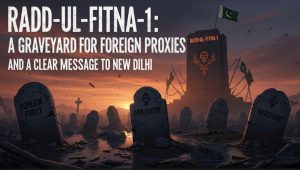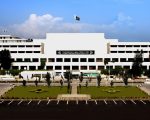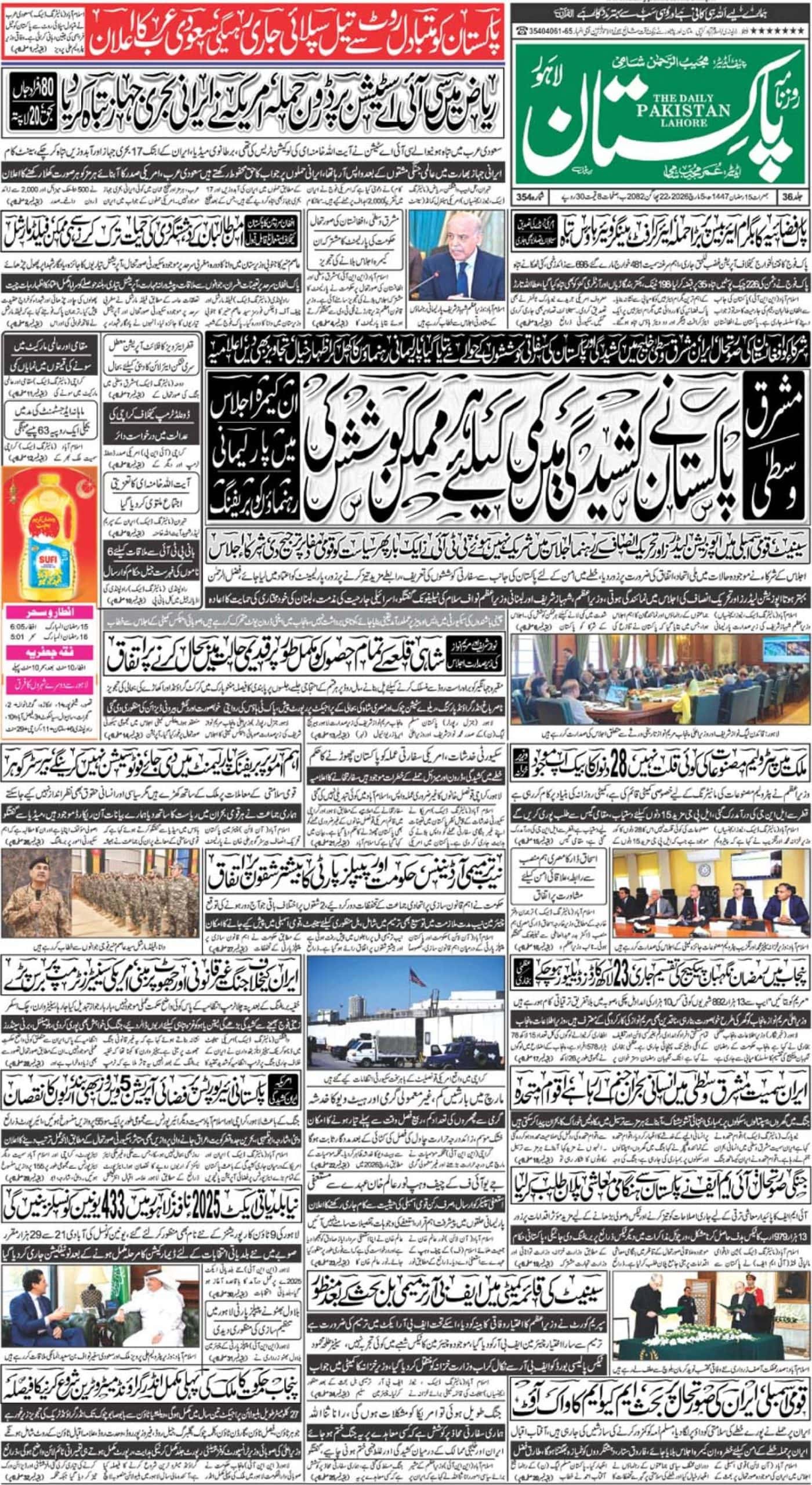“Secrecy, being an instrument of conspiracy, ought never to be a system of regular government.” –Jeremy Bentham
“Anyone who studies declassified documents soon becomes aware that government secrecy is largely an effort to protect policy makers from scrutiny by citizens, not to protect the country from enemies.” –Noam Chomsky
The Official Secrets Act has been in the news recently. The first time this author heard of the Official Secrets Act was around a decade or so ago. The renowned author and civil servant, the late Mr. Mukhtar Masood, was a member of the Selection Board of the University of the Punjab. During a break in one of the meetings he mentioned that he was aware of very dangerous things that were being done, or had been done, by the Americans at a center on Birdwood Road, Lahore. When I asked him to write about it he said that he would face action under the Official Secrets Act if he did so. Aware of how Americans set up dangerous bio-war experiments in other countries, I suggested that he write something that could be published posthumously. But he was not amenable to the suggestion.
The next time I read or saw something about the Official Secrets Act was in a remarkable book that I acquired in July 2015. It was titled “Hidden History: The Secret Origins of the First World War”. Written by two Scots, Gerry Docherty and Jim Macgregor, it was published in 2013 by a little known publisher based in Edinburgh. This book described the role of a secret group, established in Britain around 1891, that comprised a tiny inner core called the Society of the Elect, and an outer secret circle around it but unaware of it, known as the Association of Helpers, in planning WWI. These secret groups built and generated the necessary psychological, infra-structural, legal and political environment for taking the country to war against Germany, a war that Germany did not desire.
This book, which referred to these two groups as the Secret Elite, mentioned how the Secret Elite brought about amendments to a pre-existing Official Secrets Act that totally prevented government servants, genuine scholars, investigative journalists and citizens from trying to reveal even an iota of official documents. These amendments were introduced in the year 1909, and their aim was the protection of the secret, underhand and illegal activities of the Secret Elite. It was then that this author realized that our Official Secrets Act in this country was a legacy of the British Empire. Please recall that the Boer War, in which the British forces had perpetrated horrendous cruelties against Boer children, women and unarmed men of all ages, had ended in 1902, and had drawn some public ire. The Secret Elite did not want a repeat of such criticism in future.
In his outstanding book “The History Thieves: Secrets, Lies and the Shaping of a Modern Nation”, the outstanding investigative journalist Ian Cobain has traced the evolution of secrecy laws of Britain culminating in the Official Secrets Act. He also describes how the Official Secrets Act has allowed the British Establishment to conceal from the public, brutal secret wars, secret alliances and surveillance initiatives. It is to be emphasized that in the past one hundred years, or more, it has not been the US, but Britain, that has been at war every year. Thanks to the Official Secrets Act, the British public, and the world at large, is oblivious of some of these criminal wars of the British government.
On account of the Official Secrets Act, some of Britain’s most brutal wars have gone unreported and the flak against wars of aggression abroad has been drawn mainly by the Americans. One of the cruelest wars, the Dhofar War, was waged mercilessly for over ten years by the British against the Bedouins of Dhofar in Oman in the 1960s and 1970s (1963-1976) but was never reported! The Wikipedia calls it the Omani civil war! What started as a civil war was transformed, by British intervention, into a genocidal war. Dhofar is a province of Oman and Salalah is the capital of Dhofar. The war was about the oil of the region and the British wished to impose their man as Sultan against the wishes of the local populace.
In this brutal and unreported war, water wells were poisoned, the RAF bombed the Beduoins, their crops were burnt, their animals were killed, and their villages ravaged. As is the British practice, women and children were not spared. Corpses of Bedouins who had died fighting the British were hung in a market place, the Salalah souk, to send a message to everyone that anyone opposing the British would meet a similar fate. No journalists were allowed into the region and no one in Britain was allowed to write about it! The world did not know of the horrific crimes of the British against these Bedouins, until Ian Cobain brought it out half a century later
The Official Secrets Act aims at drawing a complete blanket on the nefarious, illegal and inhuman activities of the British government, and from preventing any British citizen from exposing its wrongdoings. The first chapter of the book carries the title: “A Short History of a Very British Disease: The Origins and Rise of Official Secrecy.” It may not be a coincidence that Cobain’s book also was published by another obscure Edinburgh publisher! The English publishers are probably reluctant to publish books exposing the crimes of the British government. The British government is essentially run by the English – the Scots and the Welsh are peripheral in this game. His book was published in the year 2016, at which time he was associated with the newspaper “The Guardian”. But probably on account of his books, he is no longer with any British newspaper.
In the year 1844, Giuseppe Mazzini, the famous Italian lawyer and politician, a “revolutionary”, a Freemason, and most probably an Illuminati, who was busy attempting to unify Italy, was given the stunning news that two of his associates had been arrested in Naples and executed. He was astonished that the Neapolitan authorities had discovered his men so quickly. And that led him to the suspicion that the British government was opening his letters and passing the information to the authorities in Naples. He therefore “arranged for his correspondents to place poppy seeds, strands of hair and grains of sand in their letters, all of which were sealed with wax before sending them. Each letter arrived without its tell-tale enclosures.”
When an, MP Thomas Duncombe, filed a petition on behalf of Mazzini and three of his associates, protesting the introduction of “the spy system of foreign states … repugnant to every principle of the British constitution” the Home Secretary, James Graham, made the astonishing revelation that the British government had had the power to “open and detain letters since the reign of Queen Anne.” Queen Anne (1665-1714) was queen from 1702-1714. The Home Secretary admitted that the letters of one of the four petitioners had been opened, but he was not willing to admit which one, and that “it was not for the public good to pry or inquire into the particular causes which called for the exercise.”
This drew furious denunciation from MP Duncombe and led to “a paroxysm of national anger.” The citizens were deeply concerned that the government had been opening their private letters. The MPs were themselves unsure whether their private mail was being intercepted and opened. The Times had the following to say: “No man’s confidence can be deemed secure; the secrets of no family, of an individual can be guaranteed from reaching the ear of a Cabinet Minister.” Under public and media pressure the then prime minister constituted a committee to look into the issue.
It turned out that as early as 1657 the government had established a post office and had argued that “the best means to discover and prevent any dangerous and wicked designs against the Commonwealth” was the opening of letters. In 1703, during Queen Anne’s reign, a secret “Decyphering Branch” was formally set up inside the post office to open and reseal letters. It had continued working till 1844 when the Mazzini postal scandal burst through. In 1844 it was known as the Secret Branch and had great expertise in duplicating wax seals that were used to seal envelopes. This was forgery but the government nonetheless committed forgery. As a result of the uproar the Secret Branch was quietly closed down.
Apparently there were no secrecy laws in Britain until the last quarter of the 19th century. Ian Cobain points out that between 1800 and 1850 there was an enormous increase in official documents. In 1800 the number of official documents generated by the Treasury was, on an average, 4,800. By 1849 this average had moved to around 30,000. The government, therefore, had to employ a substantial clerical force at low wages to type, index, catalog and file the documents in a proper way. Government documents, which hitherto had been dealt with by the upper classes who ran the government, were now accessible to “commoners” as well. The upper classes had generally maintained discretion about things official and had, as a matter of practice, exercised reserve and control in this regard, maintaining secrecy.
Ian Cobain writes: “Before long, secrets that had been for generations, protected by traditions of ‘discretion’ and ‘reserve’ would be regarded by some of these new clerical workers as commodities to be acquired and sold.” The government, initially, relied on existing civil law to prevent leakage or sale of documents to the press, which, by then, had, thanks to reduction of tax on paper and the trains, been able to reach increasing number of people in the country. The newspapers were willing to pay money for leaked documents because that would add to their sales.
There were instances when the government could not manage to get court decisions to punish those who had leaked documents to newspapers. In 1858 an important case was filed by the British government against the leakage of documents pertaining to the Ionian Islands, which were under British rule at the time. The inhabitants were demanding union with Greece. In November 1858 William Gladstone was sent to the islands to look into the matter. But the Daily News published two dispatches from a British official on the matter before Gladstone arrived in Ionian Islands. These dispatches seemed to prejudge the outcome of his visit.
The leak was traced to a certain William Guerensay, who after having been rejected for a position in the Colonial Office had exacted revenge. He visited a friend in the said office and simply copied the two dispatches. The government charged Guerensay under the Larceny Act emphasizing the gravity of the consequences of such leakage. It could lead to war, the government said. The judge held that the newspaper had acted appropriately in publishing the story and to convict Guerensay the government will have to show that he intended to deprive the government of those documents. Guerensay was acquitted in 15 minutes by the jury.
Subsequent to this judgement the government passed and circulated an observation that the “unauthorized use of information” was “the worst fault a civil servant could commit.” The government adjudged such conduct “unprofessional” and likened itto “cowardice by a soldier.” But the leakages continued. In May 1878, the Foreign Secretary, Lord Salisbury, had asked a clerical worker named Charles Marvin to copy the text of a secret agreement he had made with his Russian counterpart. Marvin was told that the copy was required for the Parliament and would also be published in The Times. The agreement had been made in advance of a Conference of Great European Powers and the Ottoman Empire.
Marvin decided to make some money and rushed to the office of a newspaper named Globe and Traveler and, for forty guineas, wrote down a summary of the agreement for the paper. When the following morning the news broke, Lord Salisbury was asked in the House of Lords about the authenticity of the report. Salisbury lied to the House by stating that the report was “wholly unauthentic and not deserving of the confidence of your Lordship’s House.” Angered by this Marvin immediately wrote a secret letter to several papers stating that as a Foreign Office clerk he was aware of the authenticity of the report. He also sent a verbatim copy of the first 11 clauses of the Treaty to Globe and Traveler. However, the editor of another paper (Morning Advertiser), perhaps unhappy as to why Marvin had leaked the information to a rival paper, handed over Marvin’s letter to the police.
Marvin was arrested and tried under the Larceny Act. He was charged with stealing the document and the official notepad on which he wrote the letter. The court held that if the Treaty was to appear in The Times then Marvin caused no harm in providing a summary to another paper. Secondly, Marvin was able to prove that he had used his own notepad and had not stolen it from the Ministry. Further, the government admitted under cross examination that there were no rules forbidding employees from writing to the press.
Marvin was acquitted by the court. He lost his job. The Foreign Office condemned his behavior as typical of the “cheap and untrustworthy class of people” the office was forced to hire. The Times condemned Marvin as belonging to a class of “cheap irregulars” and urged to government to “not in future seek to buy difficult reticence for ten pence an hour.” It was then that the government wrote down the rule that all official information was to be regarded as confidential unless it decided otherwise. This rule is still operative. Marvin incidentally became a successful and celebrated author.
The new rule could not stop the leakages to the press which was willing to pay for any leaked government info. One newspaper, the Echo advertised that it would pay 5 pounds for “minor news” and up to 100 pounds for “great secrets”! The editor of the Globe and Traveler was overheard saying that there was no information that he could not buy!
In the year 1887 an important event triggered the enactment of secrecy laws. A draughtsman in the Chatham dockyard was found to have sold designs of warships to an unspecified enemy state, most likely French. He was dismissed from his post but could not be prosecuted in view of the Marvin case. MPs asked in the Parliament if the draughtsman had taken any “oath of secrecy and fidelity” when he took the job at the dockyard. There were calls to institute laws to deal with such cases. At the time, the same Lord Salisbury, who had been humiliated in the Parliament as foreign secretary, was the prime minister. And he was therefore highly inclined towards such legislation.
The Admiralty initiated the draft and its proposed name was Breach of Official Trust Bill. It was renamed Public Documents Bill. The Foreign Office insisted on addition of clauses pertaining to espionage by foreign powers. When the Bill reached the Parliament in 1889 it had been given the name Official Secrets Bill. It was put up late at night on March 28 in between protracted discussions on the bankruptcy of Scotland and a Weights and Measures Bill. When the Bill was put up before the Parliament, the Attorney General, Sir Richard Webster, stated: “I just wish to say a word or two with regard to this Bill. It has been prepared under the direction of Secretary of State for War and the First Lord of the Admiralty, in order to punish the offence of obtaining information, and communicating it, against the interests of the State. The Bill is an exceedingly simple one and I beg to move its Second Reading.” Cobain points out that these are a total of 68 words.
One MP objected to such a late presentation of the Bill and therefore the second reading was moved to the following day. The Bill was passed after two remarks by two speakers. One MP remarked that the phrase “against the interests of the state” could be stretched to prevent genuine criticism, whereas the other member wanted to add something whereby those in the press, who purchased such information, could be prosecuted. After approval by the House of Commons it was moved to the House of Lords, where, after one brief remark (“in some of its details it goes too far”), it was approved. It became the Official Secrets Act (of 1889). Since it was approved speedily its flaws could not be noticed. For example, it provided for prosecution of foreign spies only during war. An attempt was made in the following year to shift the burden of proof to the defendant instead of the prosecution. The move failed on account of strong protests by the MPs.
The next most oppressive and damaging amendments in the Official Secrets Act came in 1909. But these were the result of the machinations of the Secret Elite led by Alfred Milner, the leader of the Society of the Elect as well as the Association of Helpers. Milner, along with Natty Rothschild, Lord Esher, and Cecil Rhodes, was the man behind the brutal Boer War That is why the Secret Elite has been called the Milner group sometimes. The founder of the secret society Cecil Rhodes had died in 1902 and left 150 million pounds for the Secret Elite to use it for the attainment of its goals. The Secret Elite had decided to destroy Germany. But before that, it waged the merciless genocidal Boer War to get hold of the diamond and gold wealth of Witwatersand.
During the Boer War one journalist who caused the Secret Elite real trouble was William Stead, one of the three founding members of the Society of the Elect. He could not stomach the brutality of the Boer War and broke away from them. He wrote a powerful pamphlet titled “Methods of Barbarism” in which he revealed that the British troops were raping women, plundering and looting and were engaged in senseless destruction of property. Stead was extremely well informed – some insiders were telling him all about what was going on. But Stead could not be prosecuted under the 1889 Official Secrets Act as he was the recipient, and not the source, of information. Similarly, the Manchester Guardian had reported on the horrible conditions in which the Boers were being kept in camps. This angered the Secret Elite because the public was angry at what the authorities were doing. The Secret Elite planned to plug this loophole in the law by amending the Official Secrets Act. They wanted to hold the recipient of information also responsible! But the ground had to be prepared for that.
The Secret Elite, led by Milner, knew that people do not go to war unless they are psychologically prepared beforehand and hatred whipped up against some enemy. The British public had no desire for war which Germany at the turn of the last century. Therefore, a multi-faceted propaganda campaign against Germany was launched by this diabolical secret group. Docherty and Macgregor write that papers like the “Daily Mail and its sister newspapers created sensational stories against Germany that excited the gullible of all classes.” On the other hand, The Times manipulated the ‘elite opinion in Britain, molding public policy and poisoning the climate . . .”
By 1908 The Times, the Daily Mail, The Observer and The Sunday Times were owned by one man, Lord Northcliffe. He was not a member of the Secret Elite but was on the same wavelength as regards their goal against Germany. Other newspaper editors, reporters and owners had been quietly approached by the Secret Elite. These included Westminster Gazette, Daily News and the Daily Chronicle. The British public had no idea about the secret hands that had been coordinating opinion formation against Germany.
As part of the propaganda campaign a whole genre of novels and stories creating the fear of German invasion came into being. Such sensational novels were serialized in papers creating a baseless feeling among the people that maybe Germany was indeed planning to invade Britain. Docherty and Macgregor write; “The literary war began in earnest in 1903 with the publication of Erskine Childer’s best-selling novel The Riddle of the Sands, which sounded the warning of a forthcoming seaborne German invasion of England,” The Boer War had ended in 1902 and now the Secret Elite had begun preparing for war against Germany. The propaganda war started in 1903. The novel prompted the Navy to permanently station a fleet in the North Sea!
Lord Northcliffe enlisted the services of a writer William Le Quex (his farther was French and mother English) who, in 1893, wrote a serial called “The Poison Bullet” in which Britain was attacked jointly by Russia and France. But a decade later the priorities had changed. He, therefore, wrote a novel The Invasion of 1910: With a Full account of the Siege of London. The naval chapters were written by a naval historian H.W. Wilson. Input from Lord Roberts, Commander-in-Chief of the Army “gave the impression that this was a work based on reality and not fiction.” Thus a whole genre of fiction, raising the specter of a German invasion was fed to the British public. Ian Cobain points that in the first decade of the century alone about 300 such novels were written! Such was the propaganda campaign against Germany launched by the Secret Elite.
Many of these novels were serialized in papers creating a powerful impression on the public mind. The public pressure thus created enabled the Secret Elite to establish the British Secret Service MI5 in 1909. In 2009 an official history of MI5 acknowledged that Le Quex’s novels had been the founding inspiration for the establishment of MI5 a hundred years earlier! As a result of the 300 or so invasion novels published in less than a decade and the serialization of some of those in the papers a paranoia seemed to have gripped people who seemed to see spies everywhere! A subcommittee of the Committee of Imperial Defense was set up to examine “the nature and extent of foreign espionage that is at present taking place in this country and the danger it may pose to us.”
The sub-committee, was headed by Secret Elite member, Lord Haldane, and included the First Lord of Admiralty, the Home Secretary, Commissioner of the Scotland Yard and one of the founders of the Society of the Elect, Lord Esher. It was essentially a sub-committee controlled by the Secret Elite. Despite the fact that the Germans had no spy network in Britain, the sub-committee, quite dishonestly, felt that there was evidence of a German spies and further that the Official Secrets Act needed amendments to cope with the new threats! To cut a long story short Home Office lawyers began working on the new amendments. Cleverly the amendments regarding foreign espionage, and the ones dealing with disclosure and receipt of disclosure, were put in the same piece of legislation.
The gist of the new amendments has been described very well by Ian Cobain. We quote: “Section1 covered all forms of foreign espionage. Section 2, on the other hand, was directed at the British people. It was aimed at its civil servants, politicians and police officers and at the information they possessed; at its journalists and historians with their thirst for news and knowledge; and at ordinary citizens with a sense of curiosity.”
Cobain elaborates: “Under section 2, every piece of information possessed or generated by the state becomes an official secret, regardless of its nature, and could be disclosed only in an official statement. Anybody who communicated that information without permission was a criminal.” Further, “Section 2 introduced new offences not only for those who communicated such information, but for those who received it. Moreover, the burden of proof was reversed in such cases: defendants were expected to show that information had been communicated to them against their wishes.”
Cobain comments: “Civil servants would be committing a criminal offence if they went home and discussed with their ‘unauthorized’ family members any aspect of that day’s work whatsoever (emphasis in original), and those relatives may also have broken the law.” This amendment reversed the standard legal axiom whereby you are innocent unless proved guilty. If you have received information by chance or inadvertently and have never used it, you are pronounced guilty in the eyes of the amended law – innocence is not enough you have to prove that it was given to you against your wishes!
The manner in which the Bill was passed left a lot to be desired. It reached the House of Commons on a Friday morning of August 18 at the height of the grouse season. It may be pointed out that grouse season is a season of driven grouse shooting, which is field sport in Britain. It begins on August 12 each year and lasts till December 10. The grouse are “encouraged and corralled by beaters” to fly over people with shot guns. On account of the grouse season only 117 out of 670 MPs (approximately 17%) were present in the House!
Haldane had asked his junior Col. Jack Seeley to present the Bill. Jack Seeley simply said: “The actual change in law is slight and it is perfectly true to say that none of His Majesty’s loyal subjects run the least risk whatever of having their liberties infringed in any degree or particular whatever.” Seeley lied – the Bill introduced unprecedented restrictions on freedom of speech and expression when it came to exposing the wrongdoings or crimes of the government.
Seeley did not mention section 2 and emphasized, without giving the reason, that the Bill needed to passed through all its stages that very day! And in the most “civilized” Parliament of the world, members “who attempted to speak against the Bill were manhandled back to their seats.” Cobain rightly notes: “The Commons was not so much presented with the Bill as ambushed, such was government’s anxiety that it should become law before anyone at Westminster or the country as a whole had the time to contemplate the effect that Section 2 might have on public life.”
The Act was applicable to the entire British Empire and that included the British colony of India. In 1947, when the British left they left behind, among other things, the Official Secrets Act, which was simply carried over by both, India and Pakistan.
It was the amended Official Secret Act that allowed the Secret Elite, and the government that it controlled, to lie its way to WWI. No wonder, Lord Welby said the following on the eve of war: “We are in the hands of an organization of crooks. They are politicians, generals, manufacturers of armaments and generals, and journalists. All of them are anxious for unlimited expenditure, and go on inventing scares to terrify the public and to terrify ministers of the Crown.” It is almost, as if Lord Welby knew of the existence of the Secret Elite. Perhaps he did not but had surmised what was going on was the result of a secretly planned group effort.














